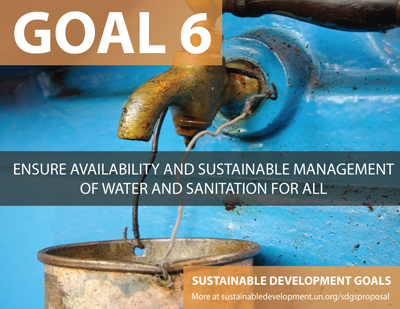|
Working Group discussing Goal 6 “Ensure availability and sustainable management of water and sanitation for all”.
 Background:
Background:
Scarcity of water, unsustainable management of the available water and poor sanitation conditions of a large portion of the global population is a hindrance in the path of creating a sustainable society. Water Scarcity affects more than 40% people of the world. Of the available water, much of it is contaminated by fecal matter, pollution and untreated sewage discharged directly into water bodies without treatment. 2.4 billion people lack access to basic sanitation services, such as toilets or latrines.
These are only few of the staggering figures that indicate the current global scenario of water and sanitation.
Adoption of the SDG Goal 6 marks that the world has come to an agreement that Sustainable Development is impossible without addressing the issues of water and sanitation at a global level. Acknowledgement of a problem is the first step towards solving it. The task that now lies ahead of us i.e the post-2015 agenda will be to honour the targets spelled out in the goal and achieve it together.
Education for Sustainable Development (ESD) has a critical role to play in achieving these targets. ESD provides the knowledge, skills and develops the competencies to find solutions. Education also acts as a driver for demand for proper facilities and paves the way for creation of national policies to fulfill these demands.
The working group brought a common understanding of the cross-cutting nature of both water and sanitation and the need for addressing this issue to achieve other global goals. It emphasized on education as a means to bring awareness to the key stakeholders – beneficiaries, government, funding agencies and other key stakeholders. It helped in formulating measurable indicators, prioritization of action areas, plan for wise utilization of available resources and explore newer funding mechanism so that the target could be achieved faster.
Objectives
This working group had been planned with the following objectives:
1. To critically examine the role of education in –
- water management with case studies
- sanitation management scenario with case studies
2. To study successful models of Open Defecation Free (ODF) areas (village or urban localities) and make recommendation on replicability
3. To study WASH in Schools (WinS) scenario vis a vis the national strategies
4. To study inclusivity in WASH from gender, disability, social exclusion and poverty point of view
Output:
- The key challenges and gaps in water and sanitation sector that education can address were identified
- A plan of action for post 2015 agenda was prepared
- Global networks and partners were identified for effective implementation of Goal 6
- Collective advocacy with the government and other implementing agencies
- A set of recommendations for WASH in Schools were formulated
Who participated?
- Policy makers and administrators associated with Water and Sanitation governance and WASH Education
- UN Bodies and Non Governmental Organizations working on WASH
- Teaching faculty, Researchers and students
CEE Focal Point: Dr. Simanta Kalita
Workshop Sessions
Date and Time |
Session title & description |
Discussion points and Speakers |
|
11 January 2016 |
|||
Session I: 14:30-16:00 Hrs (1.5 Hrs) |
Setting the tone
|
This session will –
|
|
Session II: 17:00-18:00 Hrs (1 Hrs) |
ESD and WASH |
|
|
12 January 2016 |
|||
Session III: 11:15-13:15 Hrs (2 Hrs) |
Capacities and Role of Stakeholders |
Continuing discussion on Day 1 discussion points
|
|
Session IV: 14:30-16:00 Hrs (1.5 Hrs) |
Sharing experiences |
Poster and platform presentations
|
|
13 January 2016 |
|||
Session V: 09:45- 10:45 Hrs (1 Hrs) |
Discussions |
Jigna Surkar, Gender Resource Centre, Gujarat Debendra Parekh, Environmental Sanitation Institution (ESI) |
|
Session VI: 11:15- 13:15 Hrs (2 Hrs) |
Drawing road map for post 2015 (2) |
Mayank Joshi Dilip Surkar, Director, VASCSC |
|


